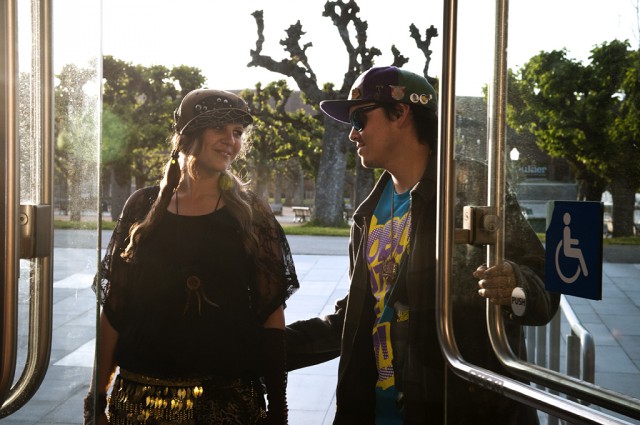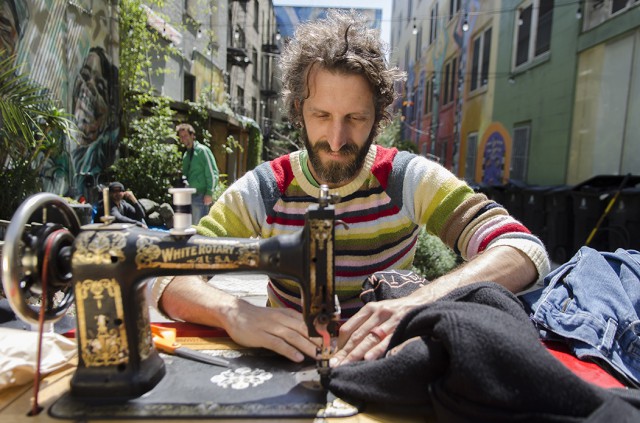
Written & Photos by Alice Debois-Froge
“I am not going to tell you about all the horrible things that happened to me. Often, people want to know how bad it is. It’s bad, I can tell you that. But tonight though, I want to focus on the positive,” announces Nikki Junker, a former sex trafficking victim, during a speech for the Freedom House’s third annual gala.
Junker is one of several guests who came to speak at the fundraising event in the packed banquet room of St. Mary’s Cathedral in San Francisco. The young woman has short straight blond hair and is decked out in a salmon pink halter dress, she completely mesmerizing the audience. Junker represents the rarely heard voice of a survivor.
“I got a chance to visit Freedom House and see some of the girls, and I was really happy with what I saw,” explains Junker. She sees a lot of programs as part of her activist work. “I am amazed by what they put together. There’s no handbook on how to help so typically there’s a lot of trial and error.”
Junker takes the time to tell the audience that besides legal aid, there are other services that can be just a beneficial to a trafficked survivor – like a haircut or a facial. Though beauty practices are not as sensational as a raid, they can do wonders for a survivor’s morale.
Freedom House
Freedom House is the first of its kind in Northern California.
It is a faith-based organization that offers up to eight beds for victims to call home. The organization also offers women long term aftercare.
“Aftercare is an area you don’t hear a lot about,” Kong describes. “It’s challenging, it’s difficult, it’s not very glamorous.”
After volunteering with Freedom House for a year, Kong left her job as an editor at a publishing company. She was hired as one of the organizations four full staff members last January.
“Meeting these women has been the most heart-breaking experience,” says Jennifer Kong, the organizations membership coordinator. “But also very eye-opening.”
According to Kong, Freedom House has provided services for 75 women, and shelter for 25 others, since its opening in 2009. Other states have even contacted Freedom house for outside help with out-of-state victims.
Junker was bought and sold at age of 18. She has since then become an activist, educator, and a fierce advocate for the awareness of human trafficking, both domestic and international.
“I don’t want to be a survivor anymore, I want to be a helper,” she concludes.

Raising Awareness
A few days before the Freedom House benefit, Robyn Miller stands tall behind the podium of San Francisco State University Human Rights Summit – she delivers a speech on modern day slavery.
During her presentation, Miller addresses the issue of sex trafficking in the US with staggering numbers. As the audience’s faces tense up, her words strike a chord among the dozens of students and teachers present in the audience.
“I was shocked about finding out that California is the biggest offender of sex trafficking,” recalls Graziella Vee, a Liberal Studies major.
According to the U.S. Department of Justice, human trafficking has become the second fastest growing criminal industry – with minors accounting for roughly half of all victims. Of the 2,515 cases under investigation in 2010, more than 1,000 involved children.
Three major cities in California – San Francisco, Los Angeles, and San Diego – are recognized by the FBI as high intensity child sex trafficking areas.
Furthermore, a year long study conducted by the American Center for Law and Justice and Shared Hope International gave the Golden State an F for its weak laws that deal with child sex trafficking.
The report concludes that “California law provides very limited options for prosecuting demand and victims of child sex exploitation of children offenses are provided with little protection under the law as victims.”
The Price of Sex
It is at the tenth annual Human Rights Film Festival, before a screening of the Price of Sex – a documentary that investigates young Eastern European women being sex trafficked – that Miller recalls the roots of her interest in commercial sexual exploitation.
There were two big factors: A speech she did on child prostitution and her parents’ job. She is the daughter of two law enforcement officials. Her father, once a police officer, now works as a paramilitary contractor, and her bad-ass cop mother works for the Alameda District Attorney’s office.
“They both worked as detectives because sex crimes happen all the times against women,” she explains. “So I became very aware of what it meant to be a woman at a very young age and the negative aspect of that, of what people, men in general use and exploit you and your body.”
Miller is first generation American. Her mother is originally from the UK. She refers to herself as European-American because of her heritage and different worldviews.
As she researches her topic, she discovers the close relationship between underage prostitution and trafficking. Neither of these are usual the topics of discussion among teen girls.
Though Miller is aware of the United States being a destination country of sex trafficking, her research has been european-based, and her focus on countries ‘sourcing out’ girls.
“I never stopped researching the topic since then because it’s an issue that I beTicame passionate about and that makes me upset,” explains the tall young woman with a porcelain-doll face, as she sits in a quiet corner of the new library.
Taking Action
For a long time, Miller considered joining law enforcement, but not with the policie department. She wanted to join the FBI to fight sex trafficking – she even applied for an internship with the agency.
Since then, her focus has changed. Miller wants to travel to Eastern Europe, and work to help develop programs that would improve the quality of life, so women aren’t tempted to leave. That, she hopes, will keep women from being victimized in the first place.
“Watching Mimi Chakarova’s the Price of Sex documentary definitely confirmed my calling, I remember calling my mom, and saying it makes me feel that what I am doing is right, I feel validated. I am not wasting my time, I am doing something legitimate. And like Mimi said, she’s doing it for them…. we’re doing it for all women.”
Her sister, Irina was born in Ukraine and was adopted as an infant by the Miller family. Miller’s mother, Nina could no longer give birth after having her first daughter and decided to adopt a second daughter.
“I think about what could have happened to her, if we never adopted her, she could have been trafficked or been a victim,” she utters passionately. “It makes me want to do it even more.”
One semester away from her Bachelor’s degree in International Relations, Miller applied to join the Peace-corps for a 27-month program that she hopes will take her to Eastern Europe. She wants to familiarize herself with those she wants to help, partake in community development programs, and help better young women’s lives by teaching them English.
Miller was one of a hundred volunteers who helped put together Freedom House’ s third annual gala, and their biggest fundraising event. With her bright red hair and a big smile on her face, Miller helped process guests at the registration booth.

The Scope
Around the world, millions of adults and children are used as commodities for commercial, labor or sexual servitude. While awareness toward human trafficking is a growing concern, the fact that the United States is a source, transit and destination country for victims of trafficking is not as well known.
Humans can be trafficked for more than sex. According to the US Department of State’s 2011 Trafficking in Persons Report, human trafficking includes: forced labor, sex trafficking, bonded labor, forced child labor, child soldiers, child sex trafficking, involuntary domestic servitude and debt bondage among migrant laborers.
It is difficult to estimate the number of victims because of the hidden nature of the crime. Federal reports indicate that the number is around 14,500 to 17,500 individuals trafficked into the United States annually.
Foreign nationals being brought here under the promise of the American Dream and citizens are tricked into a world of brutal sexual servitude in the United States.
What is sex trafficking?
Sex trafficking, or commercial sexual exploitation, comes down to being bought and sold for sex.
Prior to the Trafficking Victims Protection Act of 2000, there was no law in place addressing the issue of trafficking in the US.
“This federal act spurred laws at the state level as well, and makes the issue more visible,” explains Julietta Hua, a San Francisco State University Professor in the Women and Gender Studies Department and author of “Trafficking Women’s Human Rights.”
The TVPA considers sex trafficking as a serious violation of Federal Law and defines it as a “modern form of slavery in which a commercial sex act is induced by force, fraud or coercion in which the person induced to perform such an act is under the age of 18 years.”
It took five more years for California to follow in the Federal Government’s footsteps. The Trafficking Victims Prevention Act, or AB22, enacted in 2005 makes human trafficking a felony and includes tougher sentencing for trafficking of minors. But this legislation isn’t enough suggests a statewide initiative to toughen sentencing.
While the California law targets human trafficking for forced labor or services, and sets a three to five years jail sentence, and up to eight years for trafficking of a minor – it doesn’t set penalty for sex trafficking cases of a juvenile without force.
The Case act
An effort has recently taken root in California to update the state’s sex trafficking legislation and to make it more effective: the Californians Against Sexual Exploitation Act, which is endorsed by law enforcement, advocacy agencies, community groups as well as residents.
What it hopes to accomplish:
• Deter traffickers with higher penalties and fines.
• Remove barriers to prosecute child sex traffickers
• Mandate training for law enforcement officers.
• Require convicted sex traffickers to register as sex offenders.
• Use fines to fund victim services.
• Require all sex offenders to disclose Internet accounts.
• Protect victims in court proceedings.
According to Brian Marvel, president of the San Diego Police Officers Association that supports the proposed legislation, the “current California law does not adequately reflect the severity of this heinous crime.”
As explained in the Case Act’s Human Trafficking Fact sheet, the CTVPA was written when domestic human trafficking was viewed as a crime impacting mainly foreign nationals brought into this country. It overlooked thousands of American minors and adults who were also exploited.This initiative also hopes to raise awareness and trigger a dialogue among Californians on how to best address this issue. “With up to 17 million voters, this will form the largest single movement against human trafficking in the U.S,” states the Case Act.





